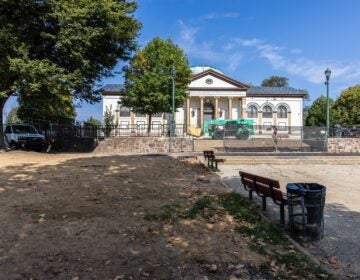What if the library could mend public life?
Ashley Hahn checks out the Free Library’s Center for Public Life, a new unit that’s aiming to connect Philadelphians of every stripe through cultural and civic programs.
Next in our series about Philly’s changing public spaces, Ashley Hahn checks out the Free Library’s Center for Public Life, a new unit that’s aiming to connect Philadelphians of every stripe through cultural and civic programs.
—
As the sun sank, birdsong gave way to lightning bugs blinking in the meadow, and a breeze cooled the picnic grove at Bartram’s Garden on a Monday evening in early August.
Over pita sandwiches and strawberries, an intimate conversation was taking place, exploring themes of the outdoor world in black literature. The group, an intergenerational collection, mostly women of color, read aloud from books byJesmyn Ward, Toni Morrison, and Percival Everett and parsed the prose. They talked about trees that bear witness, first peoples, herbalism, the moon, differences between coyotes and wolves, and black people’s historic and complex relationships to natural landscapes – from Africa, through American enslavement and freedom, into more modern and urbanized times.
They were teachers, librarians, environmentalists, writers, retirees, and the simply curious. For many, it was the second of two evenings they had spent together, a journey through works of prose and poetry by black writers guided by Kalela Williams of the Free Library’s Center for Public Life, a new unit charged with enhancing cultural and civic programs for adults.
Williams began the first session, an evening of poetry and art-making at Parkway Central Library in late July, with the essential question she hoped both nights would explore: “How do you reconcile blackness with nature?” That evening, the women paired up to read and discuss poets such as Lucille Clifton, Audre Lorde, and Sterling Brown while making suncatchers from tissue paper and leaf outlines printed on transparencies.
“I wish we could do this again. I feel like everyone cares about each other,” Gen Rollins, a young environmental-justice activist, said before disappearing into Bartram’s Garden to find a ginkgo tree. As people left in the twilight, hugs and phone numbers were exchanged. On the trolley ride home, women who were strangers a week ago chatted easily.
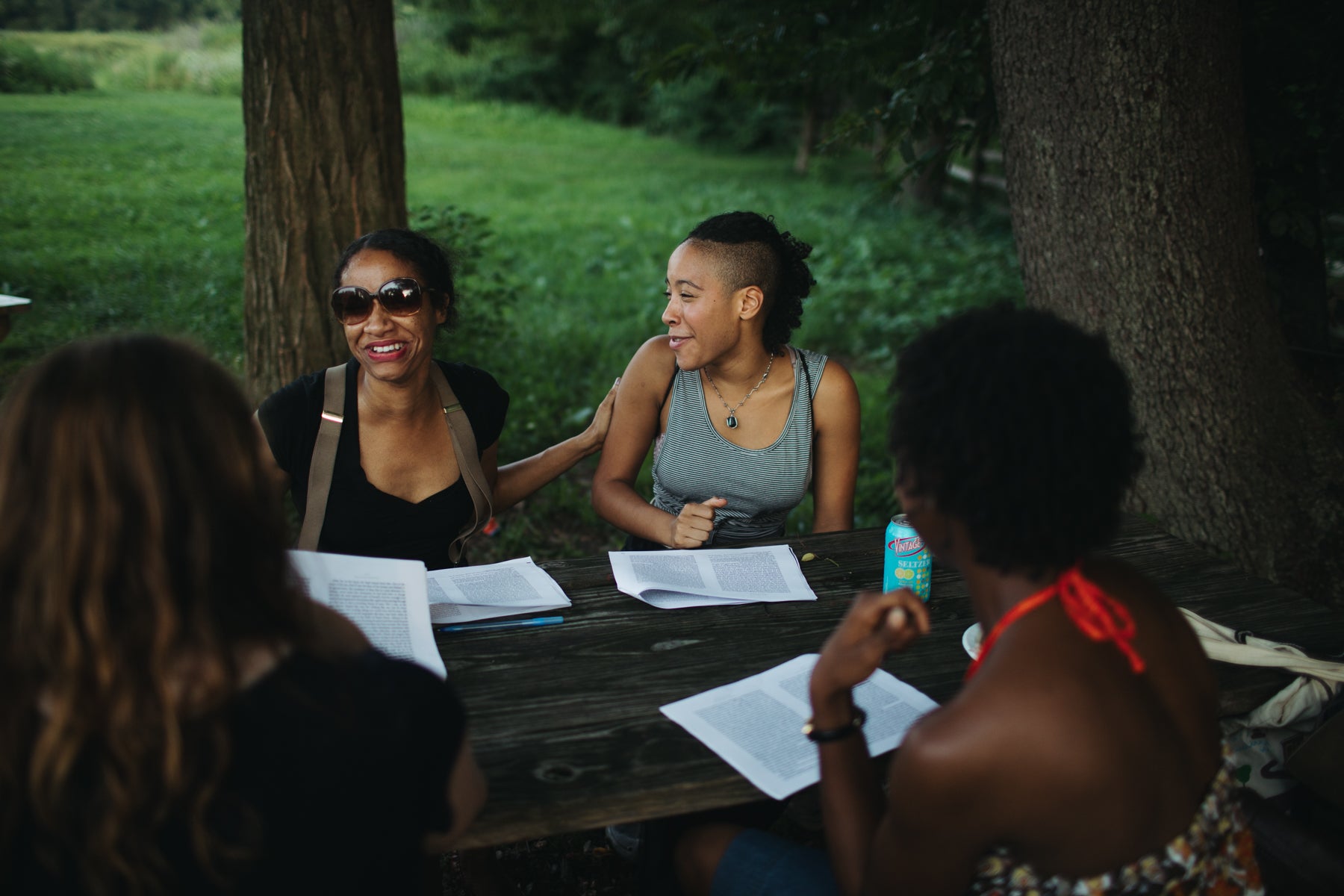
These programs, while designed around summer pleasures, hold a more subtly important purpose: connection. What good can happen when we mix with strangers? What does it look like when we hold space to learn and listen to one another? Does it help us find common ground?
The two evenings focused on black literature were part of a larger nature-themed series developed by the Center for Public Life, playing off an exhibit currently at Parkway Central called “In Our Nature: Flora and Fauna of the Americas.” This summer, Williams turned that into the question, What’s your nature? and developed programs interpreting the theme, including a birding walk from Andorra Library in early August, and a Schuylkill boat ride and acreative-writing workshop at Pennypack Park later this month.
Through the Center for Public Life, the Free Library wants to become just that – the beating heart of shared city life. For more than a century, the Free Library has provided free public access to a world of knowledge and experiences. Now, it’s trying to build on its foundational strength – its neighborhood presence and its cultural chops – to create occasions when Philadelphians of diverse backgrounds converge.
That’s an especially promising aspiration in an era when the ways we live, consume information, experience culture, socialize, and even exercise are increasingly stratified and our neighborhoods can feel like contested turf.
“The actual functioning of a democratic society depends upon a shared fabric of society. We are in the process, I think, of renegotiating what that fabric is. The library has a role to play in making sure that what we’re weaving is really durable and powerful and not just a bunch of threads that fall apart,” said Andrew Nurkin, who was hired last year to helm the Center for Public Life.
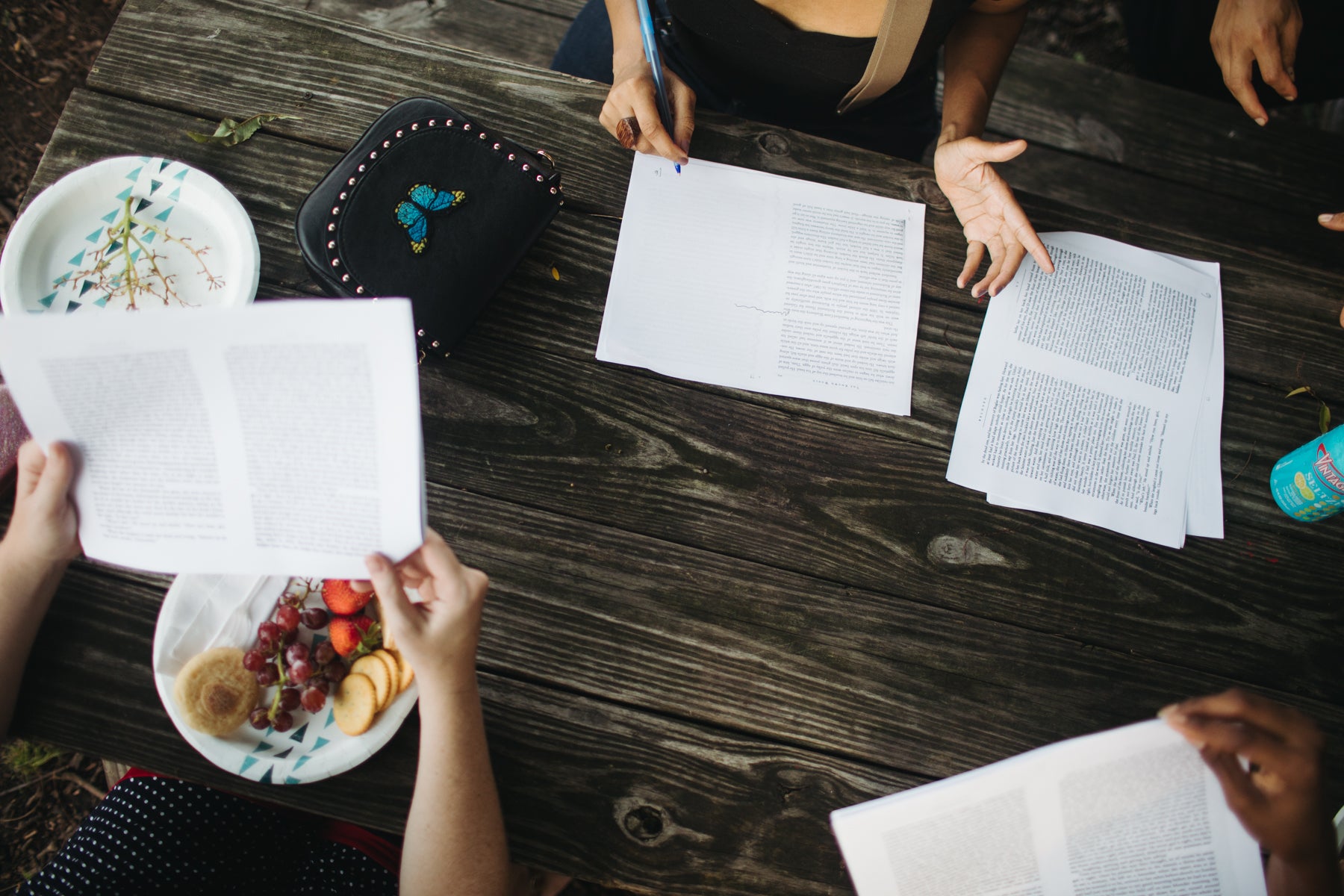
What if the library planned programs as if our civic health depended on it?
The Free Library’s renewed sense of urgent civic purpose is all the more striking given the library’s challenges after the 2008 financial collapse. A municipal budget crisis prompted then-Mayor Michael Nutter to propose closing 11 branchesat the precise moment when people needed the library’s resources more than ever – for computing, social-service connections, and job searches. These days, the Free Library is on the rebound. Deferred maintenance and aging building systems still force unexpected closures, but the Free Library’s aging branches anticipate refurbishment as part of Mayor Jim Kenney’s Rebuild initiative. Still, the library is approaching its role as one of the city’s most democratic institutions with renewed vigor.
Nurkin and his small staff work on a diverse portfolio of cultural and civic programming system-wide. They support libraries in the city’s prison system and the Stories Alive program, which enables incarcerated parents to read books via video link with their children. They mount exhibits at Parkway Central library based on its rich collections, and run the popular Author Events series. Importantly, the Center for Public Life also is charged with expanding cultural and civic programming for adults at branch libraries and, starting next year, in a new physical “commons” at the renovated Parkway Central.
Civic and cultural engagement can, of course, be one and the same. Cultural experiences spark our imaginations and present different ways of seeing the world, Nurkin said. Great works of art can present themes that transcend educational, cultural, or socioeconomic backgrounds, inviting people from different backgrounds to share their knowledge and experiences.
Part of the Center for Public Life’s work going forward is to take the library’s oldest pleasure, a sense of discovery, and offer it through experiences beyond books. “Maybe you have a serendipitous conversation with someone that you didn’t know before you go to an Author Event and have your mind completely changed by what that person says. You go to an exhibition and you see an object, but that object is interpreted or narrated in a way that changes your view of the world,” Nurkin said. And then there’s the role the library can play to convene public discussion on issues of the day.
“I’m very happy for us to enter into some of those conversations through cultural enrichment, and at the same time also do civic work,” Nurkin said. To do it well, he added, requires the library to be more deliberate about cultivating the physical, intellectual, and ethical space for people to see the library as the right venue to have these talks.
“You will always encounter someone who is different from you in the library. And if we’re doing our job right,” he said, “those encounters will be joyful and provocative and lead to transformation.”
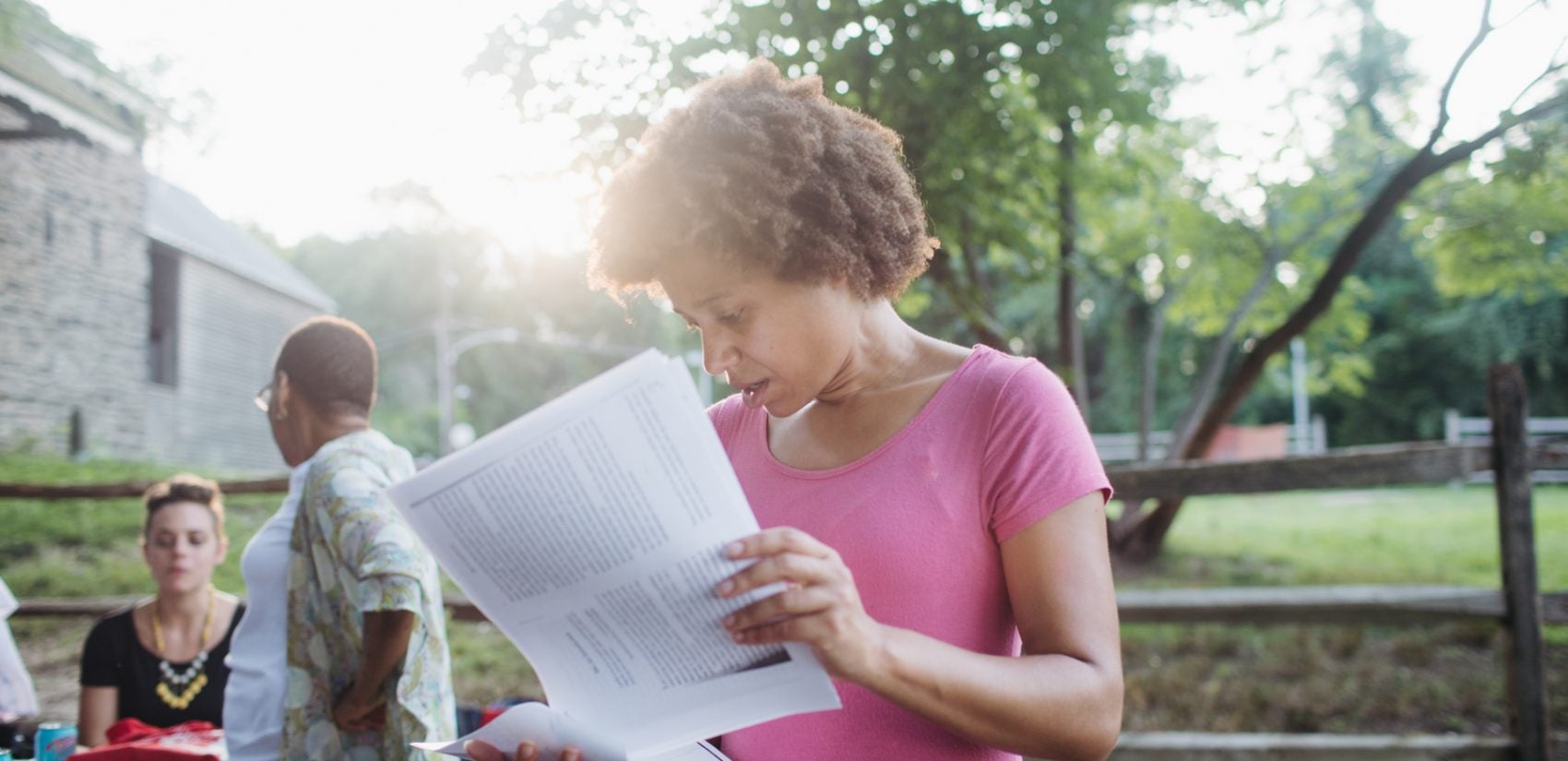
Convening conversations around neighborhood issues can be healthy, but then what? Earlier this year, the Center for Public Life and Ramonita G. de Rodriguez Library, North Sixth Street and Girard Avenue, held a discussion with The Philadelphia Citizen about “intentional neighborhoods” and gentrification. To continue that dialogue, the library is considering hosting a quilting workshop. Imagine piecing together a quilt while talking about the messy challenges of shared neighborhood life, an interpretation of e pluribus unum – out of many, one.
“Civic engagement is getting people from disparate backgrounds in the same space, to talk with each other, to connect with each other and form authentic connections. More bluntly, it’s imparting an understanding… so that people feel like we can all be in the same space, that we can understand each other, and nobody has to threaten each other. Or maybe I don’t have to worry about someone calling the cops on me when I’m doing my everyday business,” the center’s Williams said, only half-joking.
To Nurkin, civic engagement is also about mobilization.
The Free Library did not take a particularly active role in convening public dialogue before the 2016 election. But the Center for Public Life is diving headlong into programs in advance of this fall’s midterm elections, aiming to increase voter registration, information, and participation.
Many libraries are polling places, Nurkin said, but “it didn’t make tons of sense to us that you can vote at a library, but we don’t have a structure for registering to vote at a library.” Rather than host eat-your-veggies civics lessons and voter drives, the Center for Public Life is hatching programs where the cultural is political, tentatively called “This is What Democracy Looks Like.”
Williams, for example, is planning a dance workshop that explores themes of political expression in South African, West African, and Caribbean dance. “When you think about solidarity, and the right to protest, and the right to assemble or gather, and what you’re asking for – these are things that Afro-Caribbean dance has a history of expressing,” she said. That could lead to conversations about civil rights and political participation. The event is one of several planned in partnership with nonpartisan groups doing voter registration and education.
Working with the library’s Culinary Literacy Center, Williams also plans to pair cooking classes with discussions about food equity and kitchen-table issues at stake in the midterms.
With its new Authors Up Close program, the Center for Public Life is translating Parkway Central’s Author Events to the more intimate settings of branch libraries through salon-style conversations. Before the November election, former Mayor W. Wilson Goode Sr. will be an Author Up Close, discussing themes from his new book on black voter engagement.
Dance and food are hardly traditional library programs, but that’s becoming more comfortable territory for the Free Library these days. Its civic role keeps expanding, and library is learning how to adapt.
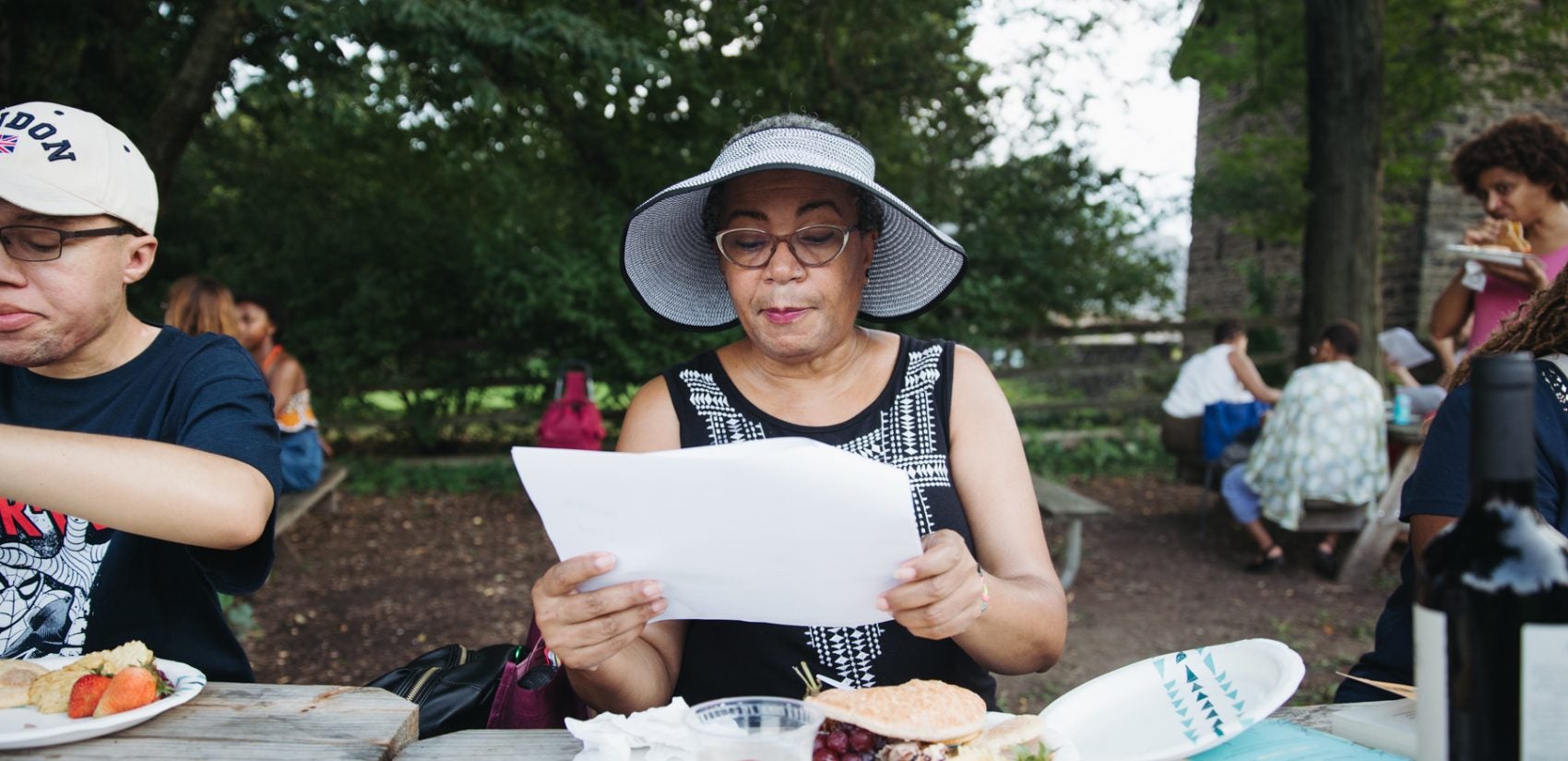
“We have a lot to offer when we keep learning.”
As its work evolves, the Center for Public Life is striving to help branch libraries adapt their offerings to the professed needs and wishes of the people they serve. One way the library is learning what neighborhoods actually want is by doing some listening itself.
The Free Library is the only system in the nation to employ community organizers – it has nine – who work to deepen its relationships with neighbors, influencing plans for programs and partnerships to better serve communities. That effort started in four neighborhoods where branches were closed for extensive renovations as part of the 21st Century Libraries initiative, which Nurkin said has resulted in more relevant programs and increased use.
Feedback at Lillian Marrero Library in Fairhill, for example, resulted in an overhaul of existing ESL classes to focus on practical interactions – not just translating grocery items, but maybe how to converse in a parent-teacher conference. In turn, that program could be the new model for how the library approaches ESL classes at other branches.
The fact that some libraries are better resourced than others is something Nurkin said Philadelphians should be uncomfortable with, so a core question for his unit is how to improve the quality, variety, and relevancy of programming across the system, leaving no library behind.
For Williams, keeping adults curious is a way to help whole families. “As adults, sometimes our day-to-day lives get in the way, and we forget that there’s a whole world out there and it’s rich with things that we could continue learning… that make us better, that make the world better. We have a lot to offer when we keep learning,” she said.
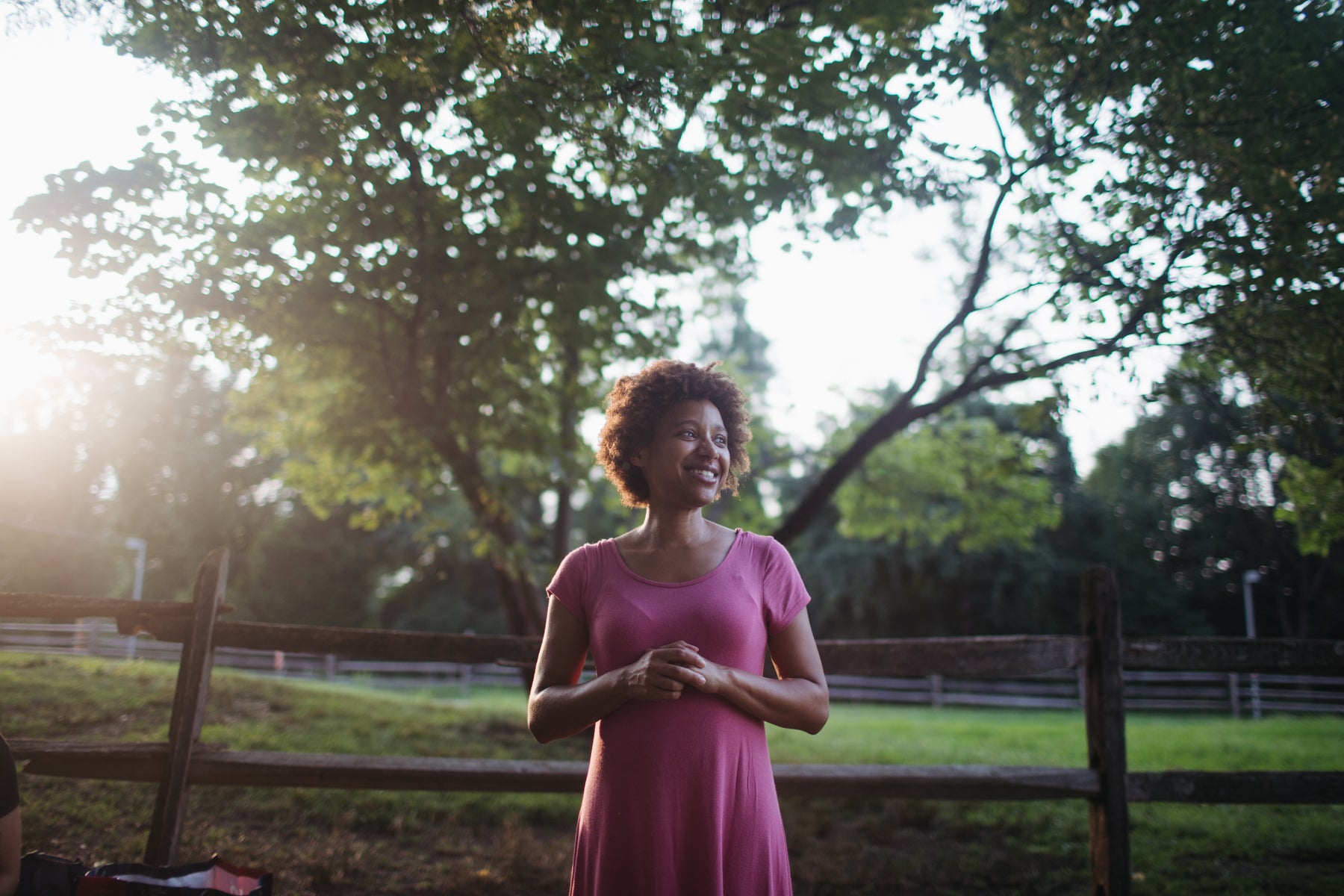
That was Janae Richardson’s hope when she showed up at Williams’ art-making and poetry night in late July with her 5-year-old daughter Milan. Richardson, a young single mom, said lately she has been enjoying peaceful time outside to work on writing poetry, which helps her manage anxiety. She came because she wanted to explore that further.
“I want to open myself up more to stuff like this. I’ve never been an actual class like this. If I’m going to be dedicated to what I’m doing, I want to surround myself with people who are interested in that as well,” Richardson said. Milan, for her part, listened, snacked happily, and made beautiful suncatchers.
“You can become whoever it is that you want in this place, for an hour because you’re reading a book and you’re transported, or for the rest of your life because you take advantage of resources to change yourself,” Williams said. “That’s what you can get from a library. It’s very democratic. It’s really what America should be about and what we as a country were meant to be about.”
As the poet Joseph Mills wrote, “If librarians were honest, they would say, No one spends time here without being changed.”
That’s the whole idea.
In Common is made possible through support from the John S. and James L. Knight Foundation.
WHYY is your source for fact-based, in-depth journalism and information. As a nonprofit organization, we rely on financial support from readers like you. Please give today.






